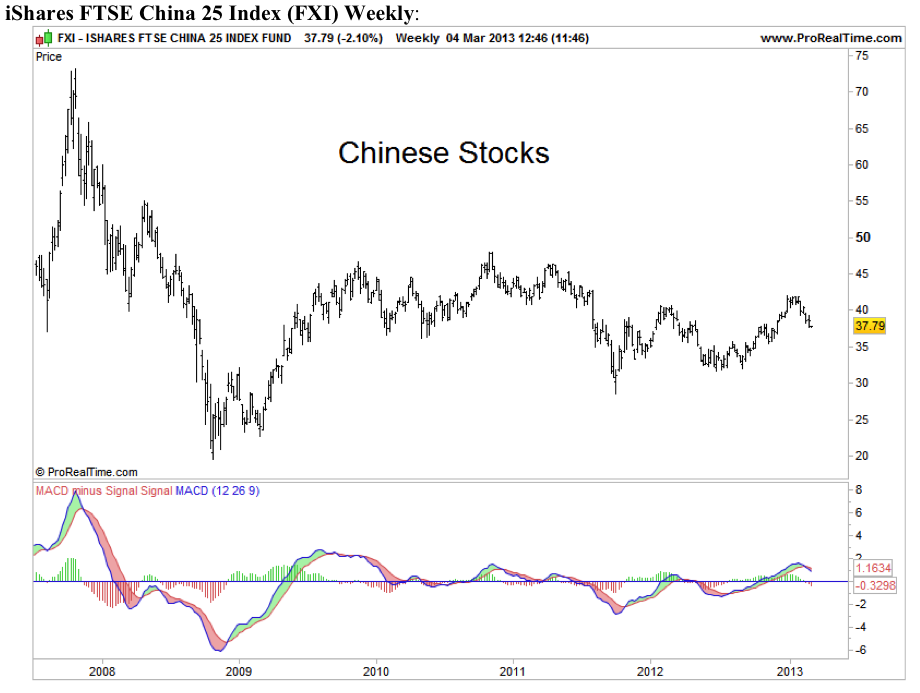
….then it may not be too early to sell Chinese stocks.
Quotable
 “By three methods we may learn wisdom: First, by reflection, which is noblest; Second, by imitation, which is easiest; and third by experience, which is the bitterest.” – Confucious
“By three methods we may learn wisdom: First, by reflection, which is noblest; Second, by imitation, which is easiest; and third by experience, which is the bitterest.” – Confucious
Commentary & Analysis
If it’s the “largest real estate bubble in human history” then it may not be too early to sell Chinese stocks.
“It [China] may have created the largest real estate bubble in human history,” was the introduction by Lesley Stahl of 60-minutes to a story about China’s real estate bubble. If you missed this story, I suggest you take time and watch it. You can find it here. After viewing this, and seeing the miles and miles and miles of empty skyscrapers, condos, and shopping centers, it is highly probable China has created the large real estate bubble in human history.
Lesley kept quoting from one of baseball’s classic movies, Field of Dreams(though JR and I prefer The Natural), “If we build it they will come,” as the rationale for all this space. But as you learn right away in the 60-minutes piece-they aren’t coming. There has been no mass migration from the rural areas to these new cities. And just maybe, as an analyst quoted in the piece said, it might be because most of the housing built in these gleaming new ghost cities is priced at about $50,000 US per unit and peasants make about $2 per day on average.
“It [China] may have created the largest real estate bubble in human history,” was the introduction by Lesley Stahl of 60-minutes to a story about China’s real estate bubble. If you missed this story, I suggest you take time and watch it. You can find it here. After viewing this, and seeing the miles and miles and miles of empty skyscrapers, condos, and shopping centers, it is highly probable China has created the large real estate bubble in human history.
Lesley kept quoting from one of baseball’s classic movies, Field of Dreams (though JR and I prefer The Natural), “If we build it they will come,” as the rationale for all this space. But as you learn right away in the 60-minutes piece—they aren’t coming. There has been no mass migration from the rural areas to these new cities. And just maybe, as an analyst quoted in the piece said, it might be because most of the housing built in these gleaming new ghost cities is priced at about $50,000 US per unit and peasants make about $2 per day on average.
Three takeaways here for me were: 1) When the migrant workers start to leave the building projects, “it is an early warning” that the debt crisis is about to begin, and the migrant workers are leaving, 2) A break in the bubble could wipe away “three generations of savings” by Chinese citizens, and 3) if the bubble pops it could spark an “Arab Spring” in China.
Yikes! Is it any wonder why Chinese leaders wish to keep the islands in the East China Sea and Japan on the front burner?
Though stock markets in most places have enjoyed heady gains the last few years—not China. This excerpt comes from an article by Edward Chancellor, “Consistency in a topsy turvy world,” appearing in today’s Financial Times:
“The mean reversion of stock market returns and returns on equity are one and the same.
“The performance of equities in less capitalistic economies seems to support this point.
“China is the most striking anomaly. Despite economic growth in double digits over the past two decades, Chinese equities have delivered an annual real return of -2.5 per cent in local currency since the early 1990s, according to the authors of the Credit Suisse Global Investment Returns Yearbook. The Chinese stock market is dominated by state-owned enterprises whose capital allocation is ultimately decided by government. Some studies suggest these businesses earn negative returns on capital once subsidies are taken into account.”
“The lesson of history is clear. Unless factories have been bombed or the country is being run by crooks or, even worse, by Communists, mean reversion is one of the few constants in an every changing investment world.”
In the eyes of Michael Pettis, a finance professor at Peking University, and a very brilliant macro strategist, China may indeed be entering the danger zone; this tends to dovetail on what Mr. Chancellor was saying [Mr. Pettis’ latest missive is a brilliant read if you have time]:
“In analyzing China’s growth in the past three decades we seem to forget that there have been many growth ‘miracles’ in the past two hundred years. Some have been sustainable and have led to developed country status but many, if not most, were ultimately unsustainable. Nearly all of the various versions have had some similar characteristics – most obviously infant industry protection, state-led investment in infrastructure, and a financial system that disproportionately favored producers at the expense of savers – but the way these characteristics played out were very different, in large part because the institutional structure of the economy and the financial sector created a very different set of incentives.”
Using the three key elements of the American System and historical development as a guide..
- infant industry tariffs
- internal improvements,
- and a sound system of national finance
…and contrasting this against China’s development, Mr. Pettis says:
“…the historical precedents should worry us. In most cases they suggest that China has a very difficult adjustment ahead of it and the closest parallels to its decades of miracle growth suggest unfavorable outcomes.”
Let’s count a break in the real estate bubble as being at the top of the list if it wasn’t already.

- Jack Crooks
- Black Swan Capital
- www.blackswantrading.com
- info@blackswantrading.com
- Ph: 772-349-6883











